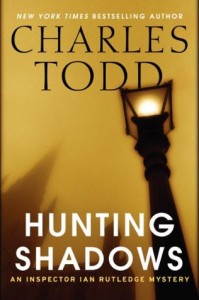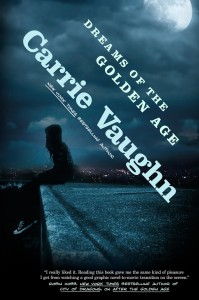 Format read:
Format read: ebook provided by Edelweiss
Formats available: hardcover, ebook
Genre: Superhero romance, Urban Fantasy
Series: Golden Age #2
Length: 318 pages
Publisher: Tor Books
Date Released: January 7, 2014
Purchasing Info: Author’s Website,
Publisher’s Website,
Goodreads,
Amazon,
Barnes & Noble,
Book Depository
Like every teen, Anna has secrets. Unlike every teen, Anna has a telepath for a father and Commerce City’s most powerful businessperson for a mother. She’s also the granddaughter of the city’s two most famous superheroes, the former leaders of the legendary Olympiad, and the company car drops her off at the gate of her exclusive high school every morning. Privacy is one luxury she doesn’t have.
Hiding her burgeoning superpowers from her parents is hard enough; how’s she supposed to keep them from finding out that her friends have powers, too? Or that she and the others are meeting late at night, honing their skills and dreaming of becoming Commerce City’s next great team of masked vigilantes?
Like every mother, Celia worries about her daughter. Unlike every mother, Celia has the means to send Anna to the best schools and keep a close watch on her, every second of every day. At least Celia doesn’t have to worry about Anna becoming a target for every gang with masks and an agenda, like Celia was at Anna’s age.
As far as Celia knows, Anna isn’t anything other than a normal teen. Still, just in case, Celia has secretly awarded scholarships at Anna’s private high school to the descendants of the city’s other superpowered humans. Maybe, just maybe, these teens could one day fill the gap left by the dissolution of The Olympiad…
Our Review:
Cass: After the Golden Age was better.
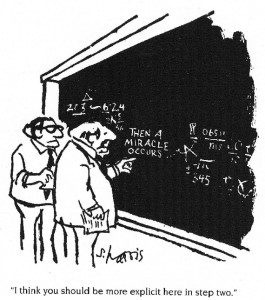 Marlene: (refers Cass to Sidney Harris cartoon). Not that I don’t agree with you. After the Golden Age was better. But I think we need to be a little more explicit in our reasons. (and for anyone who is wondering, no, Sidney Harris is not a relative. And DAMN)
Marlene: (refers Cass to Sidney Harris cartoon). Not that I don’t agree with you. After the Golden Age was better. But I think we need to be a little more explicit in our reasons. (and for anyone who is wondering, no, Sidney Harris is not a relative. And DAMN)
Cass: FINE. I can work with that. If you insist.
The primary issue with Dreams of the Golden Age was Anna. As a protagonist she left me utterly cold. I do not mind teenage narrators, so it wasn’t an issue of youth. She was just so damn boring. I didn’t care about her powers, or her typical teenage drama. For example, after a (SARCASTIC SPOILER ALERT) very bad thing happens, she immediately jumps tracks to talk prom. Seriously? There aren’t more important issues for you to deal with right now?!
More Celia and Arthur! The whole book should have been about them.
Marlene: I’m with you on Anna. So much of Anna’s angst is about her power being such a boring kind of power. It’s not showy, and it’s not offensive. It’s not even defensive. The problem is that her endless internal whinging about how dull a power she got dealt also gets boring.
Celia and Arthur? Now there’s a fascinating story. Also Celia and Mark, for that matter. Celia is dealing with so much very real and heart-rending “stuff” during the whole book. If it had been all her again, I’d have been much happier.
Cass: Absolutely! Anna’s “wah wah my powers are terrible” just made me want to reach into the book and slap her. Really? Your mother and sister have no powers at all. Remember how your mom spent her teenage years being abducted and held hostage? Maybe use your brain and figure out how to capitalize on what you’ve got. Which is so much more than 99.99% of the boring humans out there get.
I really wanted more of Celia and Arthur. I just skimmed through the Anna Chapters looking for references to them. Celia’s troubles were so much more engaging than Anna’s, I couldn’t even figure out how Carrie could stand to write Anna’s perspective alongside Celia’s.
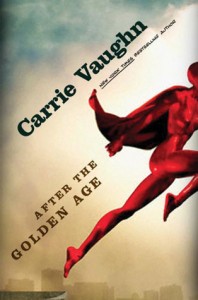 Hell, even stories about how they dealt with all the trauma from After The Golden Age would have been better. Also, will no one EVER acknowledge the serious PTSD Celia has to be rocking due to her horrific childhood?
Hell, even stories about how they dealt with all the trauma from After The Golden Age would have been better. Also, will no one EVER acknowledge the serious PTSD Celia has to be rocking due to her horrific childhood?
Marlene: In Dreams of the Golden Age, so much of what felt like the “true” story rested on Celia. And Celia’s story was a bigger and stronger story than anything focused on Anna’s point of view. Anna’s perspective was just too small. I think one of the differences between After and Dreams is that in After, Celia was an adult. She still had tons of trauma that she had to get over (and probably never got therapy for) but she had some perspective on the scope of the events taking place that was beyond her headspace. Even if some of that perspective might have been her version of the mutation.
Anna doesn’t feel mature enough to carry the story.
Cass: I didn’t think the problem was with Anna’s lack of maturity – I really blame the problem on the writing. Showcasing Anna’s perspective could have provided a very interesting counterpoint to Celia’s decisions to keep things from her children, or how Celia and Arthur’s parenting was so clearly superior to what Celia was subjected to.
The problem was that Anna’s chapters read like someone had studied teenagers by watching The WB and the Cartoon Network without ever interacting with real young people. Just because kids are hormonal doesn’t make them useless, stupid, or oblivious to the world around them. Anna’s limited perspective would have made more sense for a child much younger. Someone who was say, 10 or 12.
However, I did really enjoy the glimpses we got of what it was like living in a City of Superheroes/Villians. From both the idiotic child and elite businesswoman perspectives.
Marlene: It may be that I just plain didn’t like Anna. There were times when her younger sister Bethy seemed to have a more sensible head on her shoulders, powers or no powers.
There are plenty of totally immature adults, and mature teenagers in real life as well as fiction. Anna’s perspective just didn’t work for me in the same way that Celia’s did in the first book.
It still felt like Celia was the real central character in this story. It was her plan to arrange for all the children and grandchildren of the original experiment to get into Elmwood Academy one way or another and for her to see if the Olympiad recreated itself by, what, spontaneous generation?
She’s still obeying her own mutation, and giving her all, and it very nearly is absolutely everything she has, to see that Commerce City flourishes.
And the poor woman manages to get kidnapped. Again.
Cass: We’re definitely in agreement. Celia was the true protagonist and star of the show. I admit that I started laughing when she got kidnapped. You’d think after so many years, people would learn.
I hope that if the author returns to Commerce City, she sticks with the real movers and shakers (namely, Celia and Arthur) rather than forcing us to spend too much time with what is properly the supporting cast.
I did love Celia’s long term plans to regenerate the Olympiad. It was great to see her acknowledged for her intelligence, something that I felt most people overlooked in After the Golden Age. Brilliance may not be as flashy as setting shit on fire with your mind, but I’d rather have a Celia in my city than the (old or new) Olympiad any day.
Escape Rating C: This is hard. I want to give Anna an F, and Celia an A. So I’ll split the difference.
I would not recommend anyone read Dreams unless they’ve already read After. Too much of the plot and character development depends on knowledge of what took place in the first book.
Marlene: Let’s get past the “Up with Celia, Down with Anna” rant to talk about the overall story just a minute. And for that, I need to quote Battlestar Galactica. “All this has happened before, and all this will happen again,” with a dose of Euripides by way of Star Trek, “Those whom the gods would destroy, they first make mad.”
The plot in Dreams has a ton of recycled elements from After, starting with using the daughter’s perspective, which is why we got so much Anna shoved at us.
But the crisis is kind of the same; a secret attempt to take over Commerce City’s halls of power, hidden behind a smokescreen. The smokescreens are different, but the baseline concept feels the same. Celia’s kidnapping is just the icing on that cake.
Cass: Excellent point! “Those who do not remember the past are condemned to repeat it.” (Though I’m loving the Cylon reference, it’s not working for me, since they have thousands upon thousands of years to repeat their mistakes. This is only one generation!)
Would it kill a supervillain to crack a book on occasion? Maybe not fail at taking over the city the exact same way their predecessors did?
Marlene: The Cylons are quoting J.M. Barrie, the author of Peter Pan. A historical footnote that perturbs me no end.
It would also be a terrific thing if all the supervillains didn’t have the same parent-child rivalries, but that’s not necessarily something they could prevent by cracking open a book. Sometimes the apple does fall pretty far from the parent tree. And in a really good way.
Cass: I forgive it in this case – if only because the genesis of Commerce City Powers stems from a very limited genetic pool – it’s not uncommon for relatives to have the same mommy/daddy issues.
Marlene: This is my case of not forgiving the writing as much. It makes sense that families have similar dynamics, although we don’t know that the supervillain family in After is the same as the supervillain family in Dreams. It’s only speculation. And since family dynamics are nurture as much as nature, and there was no contact that we know of, that stretches it even further for me.
Also it’s part of the cascade of repeats. Daughter perspective, supervillain has same plot to take over Commerce City, and supervillain family has the same kind of parent/child breakaway issues.
But the grand scenes at the climax where all the supers, old and new, got together and used their powers could have been part of a climactic battle for an Avengers franchise movie.
Escape Rating B: In spite of having too much Anna and not enough Celia, the parts of Celia (and Arthur) that I got were awesome. I loved the bits about “getting the band back together”. Celia’s angst was real and heartfelt, I could feel her being pulled in every direction and never sure if she was doing the right thing.
Like Cass, I would love to see the “stories in the middle”; how Celia and Arthur managed to heal after the big mess of After the Golden Age. Or a future now that Celia is going to have to let go a little bit. And poor Mark, he’s an unsung hero in all of this. And someday, Bethy is going to be awesome.
Cass: My grade stays the same! In case anyone was wondering. There was just not enough awesome despite all the potential. (Bethy is counted amongst all the potential.)
***FTC Disclaimer: Most books reviewed on this site have been provided free of charge by the publisher, author or publicist. Some books we have purchased with our own money or borrowed from a public library and will be noted as such. Any links to places to purchase books are provided as a convenience, and do not serve as an endorsement by this blog. All reviews are the true and honest opinion of the blogger reviewing the book. The method of acquiring the book does not have a bearing on the content of the review.
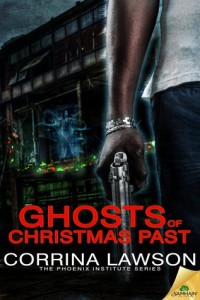 Format read: ebook provided by the publisher via NetGalley
Format read: ebook provided by the publisher via NetGalley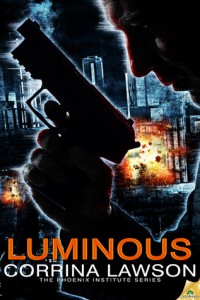 Ghosts of Christmas Past is a direct sequel to the earlier novella in this series, Luminous. It fills in some of the background gaps that were left at the end of the first book, and tells a lovely story about what happens to the hero and heroine after the supposed happy ever after. The journey to HEA is a bit rockier than anyone expect.
Ghosts of Christmas Past is a direct sequel to the earlier novella in this series, Luminous. It fills in some of the background gaps that were left at the end of the first book, and tells a lovely story about what happens to the hero and heroine after the supposed happy ever after. The journey to HEA is a bit rockier than anyone expect.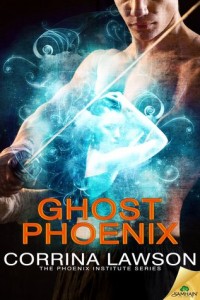 Lucy’s talent is also a variation on Marian Doyle’s talent in Ghost Phoenix. The self-healing talent seems to be surprisingly wide-spread in this relatively small group, so it is good to see that other talents are as well.
Lucy’s talent is also a variation on Marian Doyle’s talent in Ghost Phoenix. The self-healing talent seems to be surprisingly wide-spread in this relatively small group, so it is good to see that other talents are as well. Originally published at Sci-Fi Romance Quarterly
Originally published at Sci-Fi Romance Quarterly

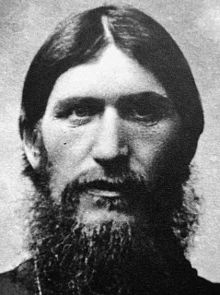
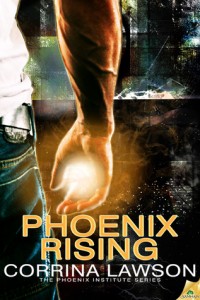

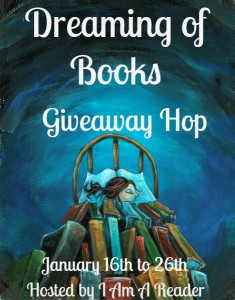

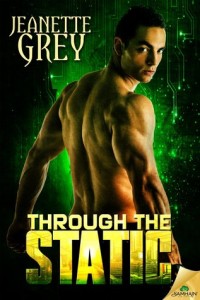
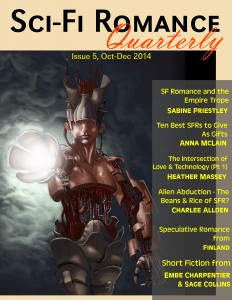
 Coming Next Week:
Coming Next Week:



